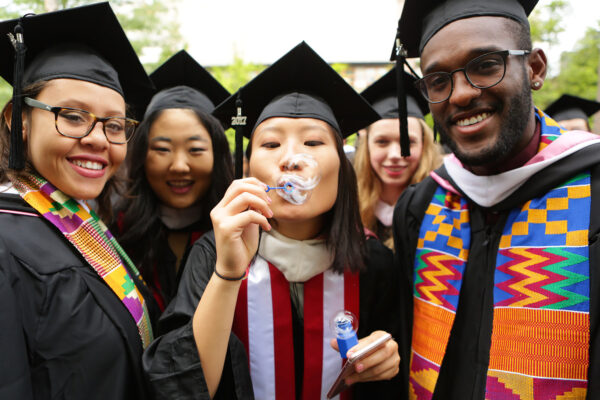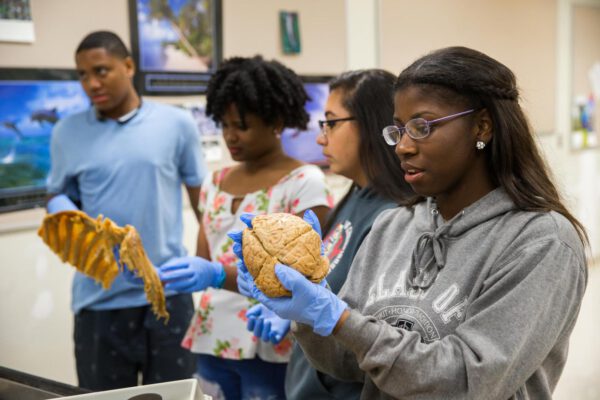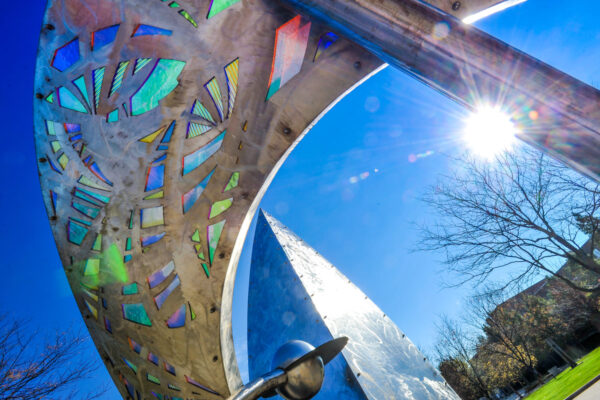Johnson & Wales University (JWU)’s diverse student population represents the many perspectives of a truly global community. The 10,000 students at our Providence, RI, campus come from 52 U.S. states and territories and 84 countries, with similar representation on the regional campuses in Charlotte, NC; North Miami, FL; and Denver, CO. Between 2007 and 2012, JWU’s international student population grew by more than 50 percent.
Due to the shifting composition and needs of our community—and in keeping with JWU’s mission of encouraging cross-cultural engagement to prepare students for the global workforce and civic life—university leaders undertook a strategic plan in 2012 that incorporated recommendations from ACE’s At Home in the World: Bridging the Gap Between Internationalization and Multicultural Education. Specifically, the new plan provided for “visible leadership and collaborative strategies that transcend the historical divide between internationalization and multicultural education to ensure that students can live ethical, meaningful, and productive lives in an increasingly diverse and complex world.” (ACE, 2007).
 On this conceptual foundation, spanning the divide between internationalization and multicultural education, the BRIDGE Center was created at our Providence campus in 2013. BRIDGE is an acronym for Building Relationships, Intercultural Dialogue, and Global Engagement. Our goal for the BRIDGE Center is to support and catalyze the knowledge, skills, resources and attitudes of JWU’s diverse student body. Housed within JWU Global (which includes International Student Services and Study Abroad), the Center encourages students to appreciate the world’s complexities, consider different perspectives, express curiosity about the world and the people in it, challenge their frames of reference—and to act. Through BRIDGE Center programs, members of the campus community can fulfill their responsibilities to “model ethical behavior and local, national and global citizenship”—one of JWU’s “Guiding Principles.”
On this conceptual foundation, spanning the divide between internationalization and multicultural education, the BRIDGE Center was created at our Providence campus in 2013. BRIDGE is an acronym for Building Relationships, Intercultural Dialogue, and Global Engagement. Our goal for the BRIDGE Center is to support and catalyze the knowledge, skills, resources and attitudes of JWU’s diverse student body. Housed within JWU Global (which includes International Student Services and Study Abroad), the Center encourages students to appreciate the world’s complexities, consider different perspectives, express curiosity about the world and the people in it, challenge their frames of reference—and to act. Through BRIDGE Center programs, members of the campus community can fulfill their responsibilities to “model ethical behavior and local, national and global citizenship”—one of JWU’s “Guiding Principles.”
The BRIDGE Center is a welcoming, inclusive space for the open exchange of ideas. On a day-to-day basis, JWU community members interact in ways that enhance teaching, learning and citizenship. As one professional staff member said during a community conversation, “the BRIDGE Center is the living room of the JWU Providence campus.”
Following a “town hall” discussion about the 2014 grand jury decision in the shooting death of Michael Brown in Ferguson, MO, an international student from Europe who was especially interested in comparative race and justice issues devised a new dialogue series called Regulated Injustice? An April 2016 panel, “Race in the Culinary Industry,” was well attended and provocative as a result of the groundwork that was established through this series. This reflects one of the ways in which the BRIDGE Center has become the locus for our Providence campus community to openly grapple with complex, culture-bound understandings of race in the United States and of social justice issues in a global context.
Initially, BRIDGE Center activities were designed to be purely co-curricular, but alignment with academic programs has steadily increased, largely due to faculty interest in experiential learning to complement classroom learning. The JWU Global Speaker’s Series, for example—organized in partnership with academic departments across campus as well as community members—has addressed issues with local, national, and global implications, such as food sovereignty and food justice; the impact of social justice issues on international student experience; and mental health in a global context. The BRIDGE Center now has a formal partnership with the College of Management, in which professional staff work with faculty to integrate multicultural, intercultural and social justice exercises in their hospitality and marketing courses. This has also spurred a Diversity & Inclusion Training Corps, which includes faculty and staff from across campus delivering content in various trainings and courses and supporting continuity for dialogue between academic and co-curricular settings.
Between fall 2013 and spring 2016, participation in BRIDGE Center programs has almost doubled (approximately 3,500 during the 2013-14 academic year, compared with some 7,000 in 2015-16), and new collaborations across departments and offices arise from the many campus stakeholders who get involved. In addition to tracking participation numbers, we have created a learning outcomes-based assessment plan grounded in the constructs of the BRIDGE acronym (Building/Sustaining Relationships; Intercultural Dialogue/Cultural Integration; and Global Engagement/Citizenship) that incorporates qualitative data.
 Not Just Coffee Hour is one weekly BRIDGE Center program selected for assessment during the 2015-16 academic year, undertaken through attendance tracking and qualitative responses from participants. The data so far reflect that 249 unique individuals participated in Not Just Coffee Hour, many of whom attended on a regular basis. Of these participants, well over 50 percent have indicated that the value of Not Just Coffee Hour for them is the opportunity to “make friends,” “learn about different cultures” and “talk about topics that we don’t normally get to in our daily lives.”
Not Just Coffee Hour is one weekly BRIDGE Center program selected for assessment during the 2015-16 academic year, undertaken through attendance tracking and qualitative responses from participants. The data so far reflect that 249 unique individuals participated in Not Just Coffee Hour, many of whom attended on a regular basis. Of these participants, well over 50 percent have indicated that the value of Not Just Coffee Hour for them is the opportunity to “make friends,” “learn about different cultures” and “talk about topics that we don’t normally get to in our daily lives.”
We also hear directly from JWU students about the BRIDGE Center’s impact. According to one:
The BRIDGE Center has quickly become my favorite spot on campus. There is not a day I go in there that I am not welcomed with overwhelming kindness by strangers from all over the world, some of whom have now become great friends and work/school partners. The BRIDGE Center has created an environment where no one is afraid to talk, or more importantly learn about other student’s cultures, history, and lives. Through BRIDGE center programs I have been able to learn so much about the world around me on a global level, and for that I am so grateful. The Center has instilled a sense of global community into everyone that walked through the doors; and their bean bags, ball pit, and comfy couches invite insightful conversations between people who may not otherwise have even met.
JWU’s commitment to global and multicultural learning is not limited to students but is truly institution-wide. Through the Employee Development Institute, staff can now participate in BRIDGE Center programming for their professional development. The Center is also part of a larger campus network that includes the Faculty Center for Academic Excellence and Innovation, which works toward creating more culturally responsive learning environments—classrooms that acknowledge and incorporate a variety of cultural perspectives and interactions.
JWU’s BRIDGE Center is the result of bold and creative thinking about how to encourage international and intercultural engagement. It has given rise to new synergies and collaborations across our Providence campus and has advanced comprehensive internationalization across the four-campus system. As a signature initiative that transcends the Center’s physical space, BRIDGE has helped position Johnson & Wales University as a leader in putting to work the At Home in the World concept.
The At Home in the World initiative was a 3-year effort funded by The Henry Luce Foundation. ACE’s Inclusive Excellence Group and Center for Internationalization and Global Engagement worked collaboratively with a select group of 8 institutions to advance new analytical frameworks, enhance pedagogy, and develop innovative ways of fostering collaboration between internationalization and diversity/multicultural education on campus. Information and resources are available in the At Home in the World Toolkit.
If you have any questions or comments about this blog post, please contact us.


